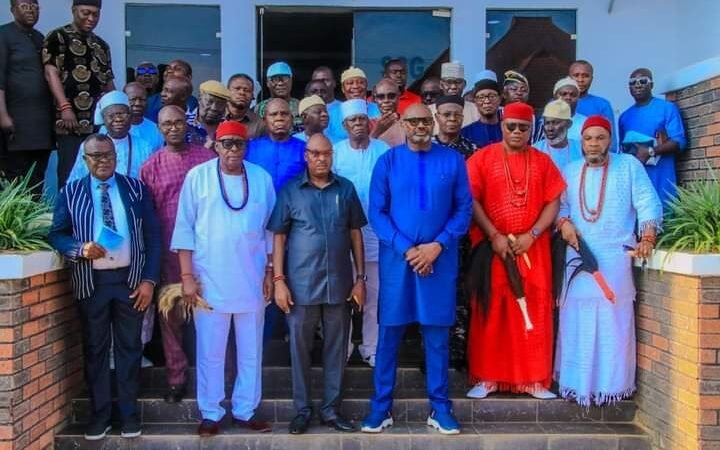The Delta State Government announced that the development of the Asaba Waterfront aims to promote effective urban renewal and enhance the state’s tourism potential.
Dr. Kingsley Emu, the Secretary to the State Government (SSG), shared this information after a meeting with representatives from the host communities of the Asaba Waterfront Development project and the project consultants.
In a briefing with journalists, Dr. Emu explained that the Asaba Waterfront City project, initiated three years ago along the banks of the River Niger, is envisioned as Africa’s newest upscale, smart, and tech-driven city.
He highlighted that the project is a Public-Private Partnership (PPP), where the Delta State Government holds 15 percent, Asaba communities hold 5 percent, and private investors hold 80 percent. The project will be financed through a combination of equity, debt capital, and pre-sales financing.
He said: “About three years ago, we embarked on the Asaba Waterfront Development Project. We acquired approximately 1,000 hectares of land, divided into two sections: one allocated to North China and the other to Falkland.
“The concept is a PPP. Initially, the locals started making private arrangements with developers, which we realized could lead to urban slum development and security issues during allocation. Therefore, we decided to acquire the entire 1,000 hectares.
“In compliance with the Land Use Act, we invited all interested parties to express their interest through a memorandum, which we published in major newspapers. We received numerous responses and identified all the involved communities. We then brought in consultants to assess the area for compensation, ensuring that all parties were accounted for.
“Compensation sums were determined, but the election delayed the process. During our engagements, we informed the communities that there are three parties in this venture: the developers with 80 percent, the government with 15 percent, and the community with 5 percent.
“This is a modern city and part of our urban renewal plan. The area will be sand-filled, cleared of debris, and developed with world-class infrastructure.”
Dr. Emu emphasized that the Delta State Government is making significant sacrifices to ensure the project’s success and urban renewal in the area.
“For the government, 15 percent may seem substantial, but it is minor compared to what the government should typically receive. Normally, the government would earn Certificate of Occupancy (C of O) fees and future ground rent, amounting to about N5 billion, which the government has forfeited. Additionally, the government has started paying compensation and is constructing a six-lane road to enhance the area, costing approximately N5 billion.
“By preventing the local approach, which could have resulted in security issues costing over N10 billion, we now have a collaborative urban renewal plan. This new city will attract tourists and generate revenue without government management, as the private sector will handle it.
“With the 1,000 hectares becoming a tourist attraction, it will bring substantial revenue to all parties. The private sector will create infrastructure to interconnect the entire area, marking the beginning of major urban renewal in Asaba.
“We are pleased with this development, continuing Governor Sheriff Oborevwori’s valuable initiatives. The Asaba community will greatly benefit from this intervention.
“Additionally, the dredging of the River Niger, located along the shoreline, will significantly boost tourism. This is the story of Asaba Waterfront City,” added Dr. Emu.


